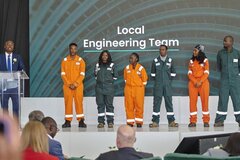As we celebrate International Volunteer Day this week, here is the fascinating story of how two Baker Hughes employees, over 4,000 miles apart, turned their passion for cycling into powerful, inspiring, and enduring efforts to raise funds and awareness toward the fight against multiple sclerosis (MS).
Pamela Barclay in Aberdeen, UK and George Bernhardt in Houston, USA tell us about their volunteering journey and how others can get involved.
Pamela Barclay
The Grampian Multiple Sclerosis Therapy Centre supports people living with MS in the North East of Scotland by providing oxygen therapy, either in the hyperbaric chamber or in an ambient pressure oxygen room. They also treat fibromyalgia, cancer, burns, stroke, long covid and sports injuries. The center does not receive government funding and is entirely dependent on donations for its survival.
For me it’s personal: I wanted to be involved with a worthwhile cause, helping my local community. To see the centre grow from strength to strength and be able to continue to provide the therapy to people in this region is so important.
I've had MS for 26 years. I only started really struggling with it about 6 years ago. And to be honest, I didn't actually tell anyone until then, I just kind of got on with it and dealt with it the best I could. Back then is when I started having some mobility problems and walking started to become a struggle.
This is when I got involved with the Grampian MS Therapy Centre. They also treat cancer, stroke, heart problems, broken bones, and eczema patients. It was recently proven that hyperbaric oxygen can also help treat long COVID. This centre is vital to the people in the North East of Scotland and this was a primary reason to support them during the pandemic. The center needs funds to continue operating locally.
It’s a really small unit, with only 3 permanent staff working there. A physiotherapist and a part time reflexologist also come in, to care for patients with neurological conditions.
At first, I did some volunteer work there, helping with the hyperbaric chamber, a couple of hours here and there for holiday cover or during busy periods.
The chamber provides hyperbaric oxygen therapy under pressure, it's a bit like a diving experience. It has been shown to reduce the inflammation in the body and the nervous system. I started going along regularly to learn more and try to manage my own condition. It doesn't cure MS sadly, but it just helps manage the difficulties on a day-to-day basis.
I am by nature a very optimistic and upbeat person. I do a lot of volunteering with the MS Society, and work with another group called the Aberdeen Independent MS group . My goal is to help people who are experiencing the same problems as I have, and some of them are much worse. Whatever I can do to help others living with this chronic condition, until such times as, fingers crossed, we find a cure.
I started cycling during lockdown in 2020. It was a challenge to be honest, because of my mobility problems, so I invested in an electric, power assist bike. It may seem a bit like cheating, but when some days you struggle to take 2 steps forward, it suited me fine. So last year, I cycled the equivalent of the distance between John o'Groats and Land's End, from the highest northern point of Scotland to the furthest southern point of England, 874 miles in total.
I did it as a ‘virtual’ challenge over 2 to 3 months: I was adding up miles daily on my Strava app, while keeping myself moving on local short rides. And as I did my own ‘tour de force’, I was raising funds for the therapy center which was struggling during the pandemic. I am so proud of that achievement, given my condition.
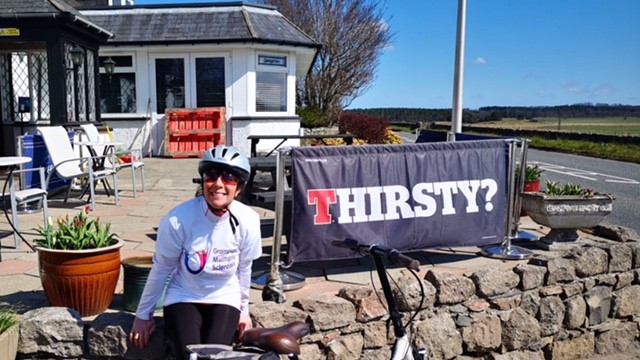
Earlier this year, in April we had an event called the Kiltwalk, this year it was a virtual one, due to the pandemic. It is a regular thing we do in Scotland, to raise funds for various charities. You can walk it, you can dance it, you can have kids bouncing on a trampoline: whatever they want to do to get sponsorship and raise funds for any of their own local charities. Everyone is supposed to wear a kilt or something Tartan, as a tradition.
In the absence of a group event in 2021, I decided to cycle it as a ‘virtual’ participant, logging my miles and fundraising via their website’. Over two unusually sunny days, I rode 30 miles each day and we raised GBP14,000 for the Grampian MS Therapy Centre.
I had downloaded The Proclaimers song, you may know it, ‘I will walk 500 miles’, and had it blaring out of a little speaker, cycling around with my tartan leggings and my Grampian MS Therapy Centre T-shirt. I got some strange looks from some of the local farmers on the country roads while I was cycling around. I think it got people smiling.
Knowing I am helping others with this condition, giving back to my community brings me a lot of comfort.
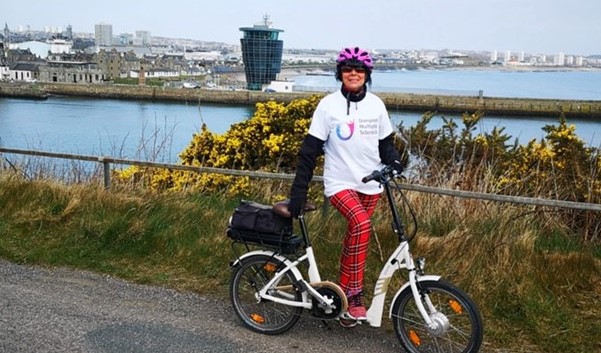
The company supported the Grampian MS Therapy Centre as one of the nominated charities this year through the Enabled ERG group in Aberdeen, as well as the Kiltwalk event, promoting it and encouraging people to take part. The company also matched the funds I raised personally, as part of our employee volunteering program.
George Bernhardt
The Texas MS 150 is a charity bicycle ride that challenges teams to make the 150+ mile trek from Houston to College Station, TX. It’s one of the 68 annual Bike MS events organized by The National Multiple Sclerosis Society across the US. Bike MS is the largest fundraising cycling series in the world, and it has raised more money than any other cycling event for any other cause. The rides involve nearly 75,000 cyclists and more than 6,000 teams. The $1.4 billion raised supports resources for people living with MS and research to find a cure.
Over the last 20 years, Baker Hughes riders have raised more than $2M for MS research. Our team, The Baker Hughes Express, has had up to 125 riders in previous years. It’s open to all Baker Hughes employees, contractors, family, and friends and anyone can sponsor the team or individual riders.
I actually started cycling a little over a year before my first MS 150 in 2013. It was one of those things on your first time you ask yourself: ’can I really do this?’ So, it was a personal challenge to do a two-day ride over 150 miles.
I thought I had set a fairly modest fundraising goal, though compared to most people, it was quite high, but I didn't know that at the time. And then somebody called me and asked if they could match my entire fundraising goal of US$2,000. Then, another person called, another group offered to match my funds, and soon enough, through my network, US$2,000 had turned into US$12,000, and it kept going from there. In the end, I raised US$24,000 the first year I participated!
Pamela and I were introduced virtually last spring. I was very inspired with what she’s been doing. She cycled 800 miles in 8 weeks: wow!
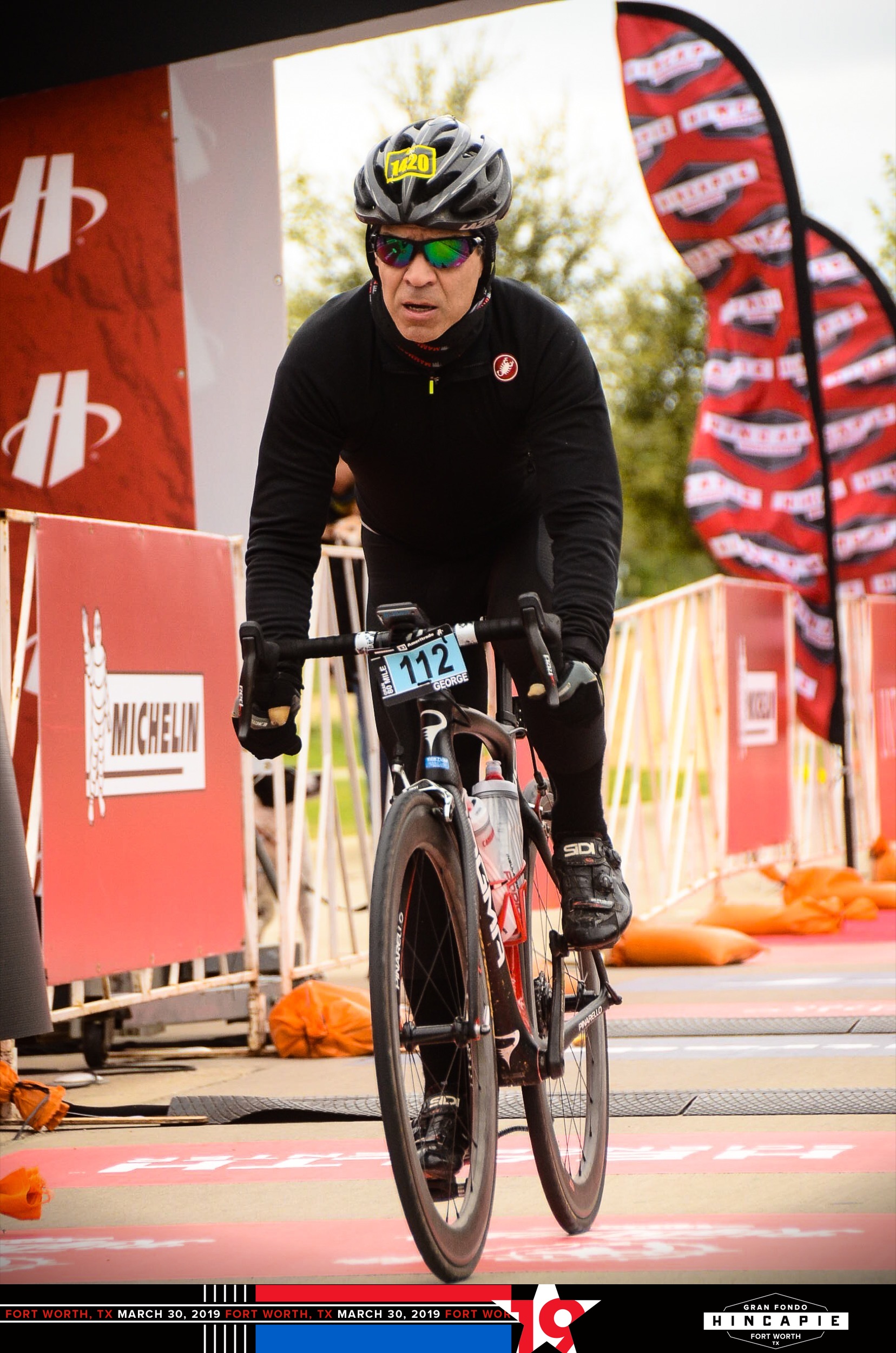
The Baker Hughes team has raised over US$2 million since we started. Personally, I'm at $240,000 so far. I've got $10,000 to raise for the $250,000 lifetime fundraising level at the Hall of Fame; however, my personal goal for the year is to raise $25,000.
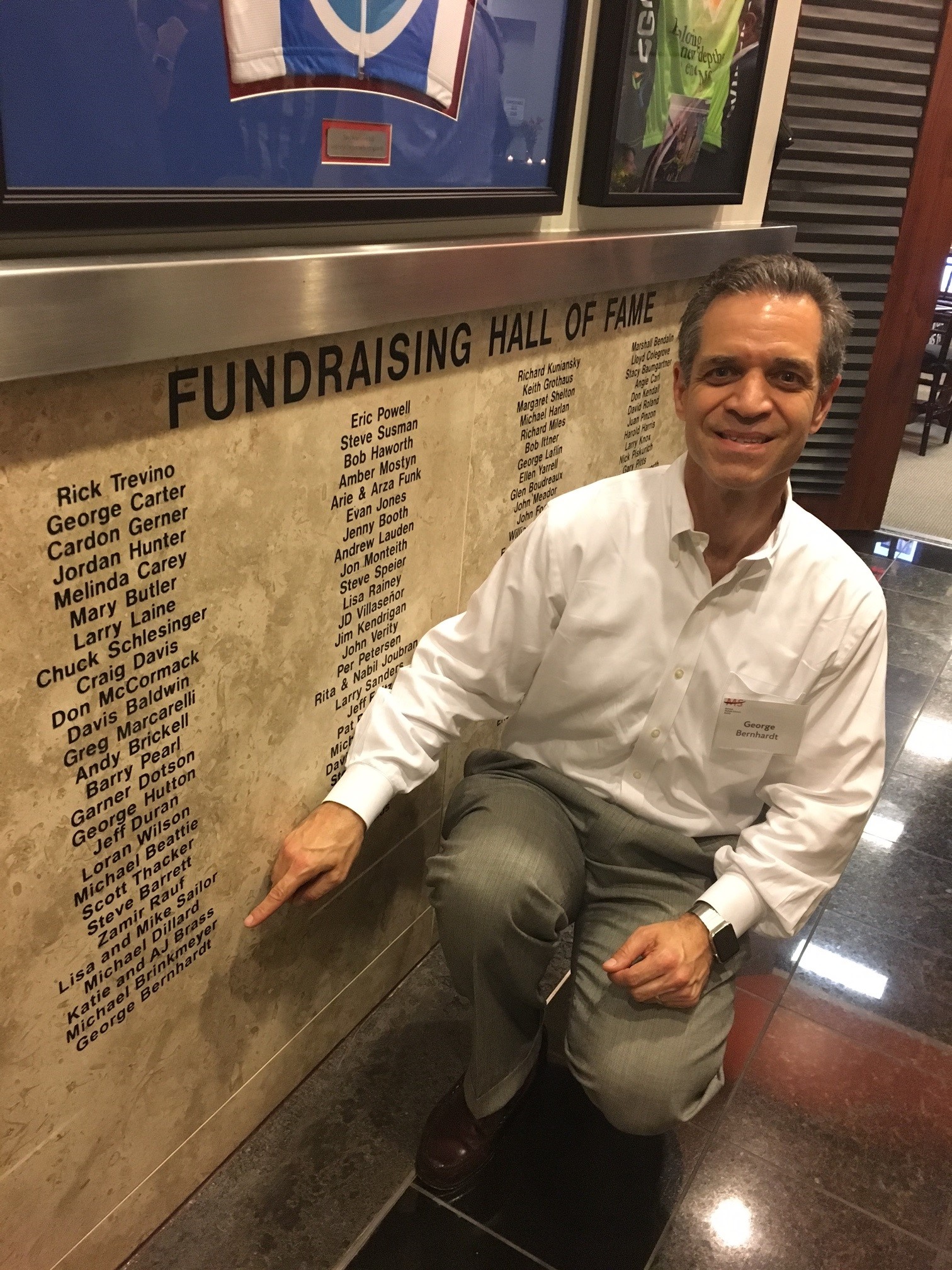
Riding the MS-150 is always interesting. People on the side of the road waving, playing music…etc. There is a little town called Fayetteville, where you cycle through the middle of town. It seems like the entire population lines the streets, and they’ve got some music playing, or playing live instruments and there’s a bubble machine on and cyclists are riding through bubbles. It's always a lot of fun.
I also remember seeing people doing the ride on a unicycle, and one of these old penny farthing bikes.
It has been a tough couple of years for MS150: it was cancelled in 2020 due to the pandemic, and this year’s ride got hit by bad weather, so cancelled once more. A lot of companies have withdrawn their sponsorship as a result. But we continue to have the support of Baker Hughes, to make a difference.
The ride is an important part of my work life, and the company has always been supportive when I need to take time away from work to run our MS150 cycle team. Through good times and harder ones, the team has been active for close to 20 years. That’s something.
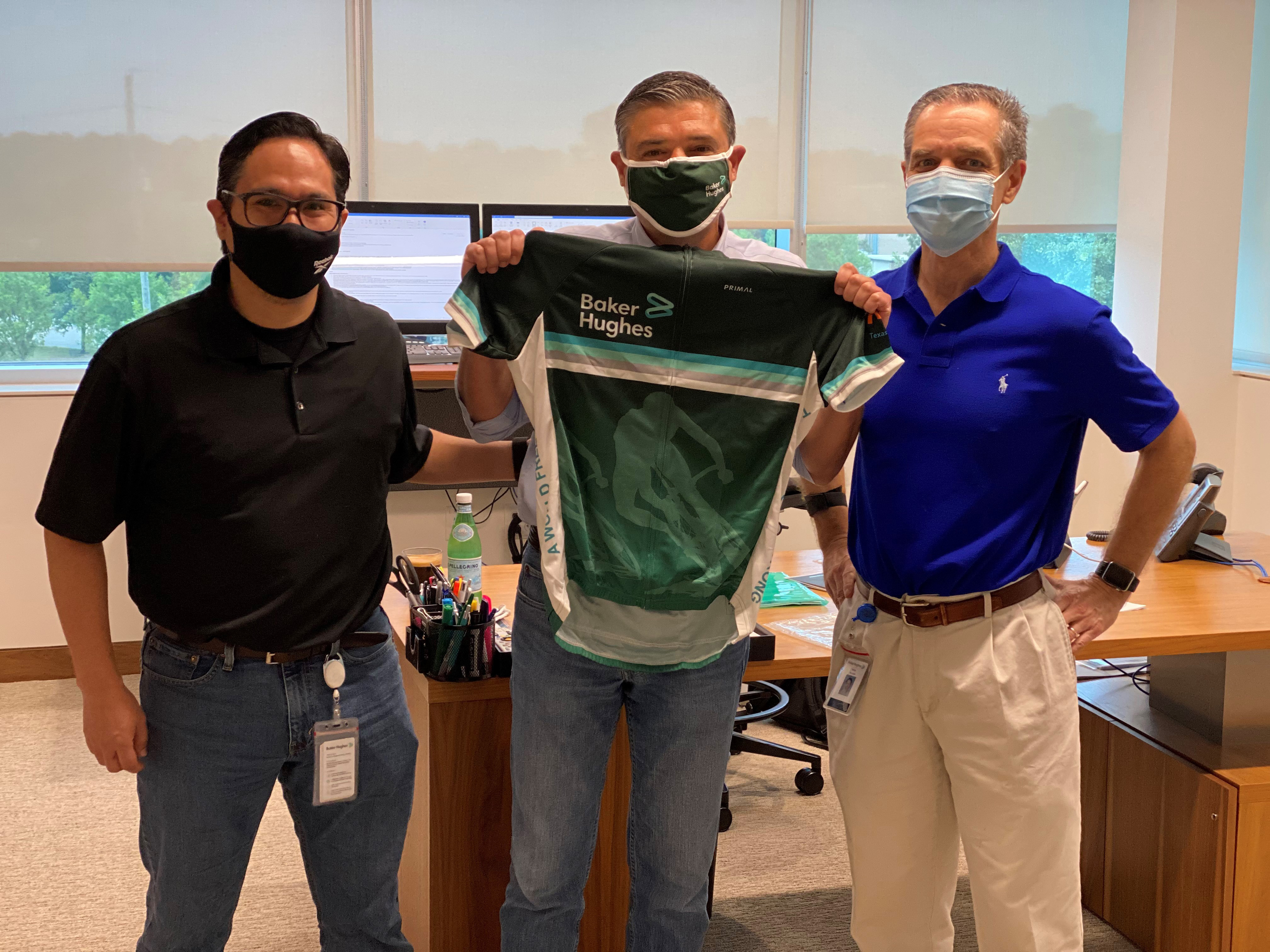
We would encourage anybody who has ever had an interest in supporting such a cause, to give it a try.
If the challenge seems impossible to you, until you actually do it, you realize anyone can. It is truly empowering, and you don’t need to be a pro cyclist at all.
When we both started our cycling journeys for MS, only a few treatments were available, mostly in hospitals. Now nearly a dozen treatments are available and new therapies have become proven – these are great causes to raise money for, with such successful research work. We can actually see medical progress within our lifetimes. That is very rewarding.
To donate or join the team, please be sure to check the Quick Links below.
Energy Forward Stories
Sign up to stay up to date on the latest innovations and people shaping the future of our industry.

